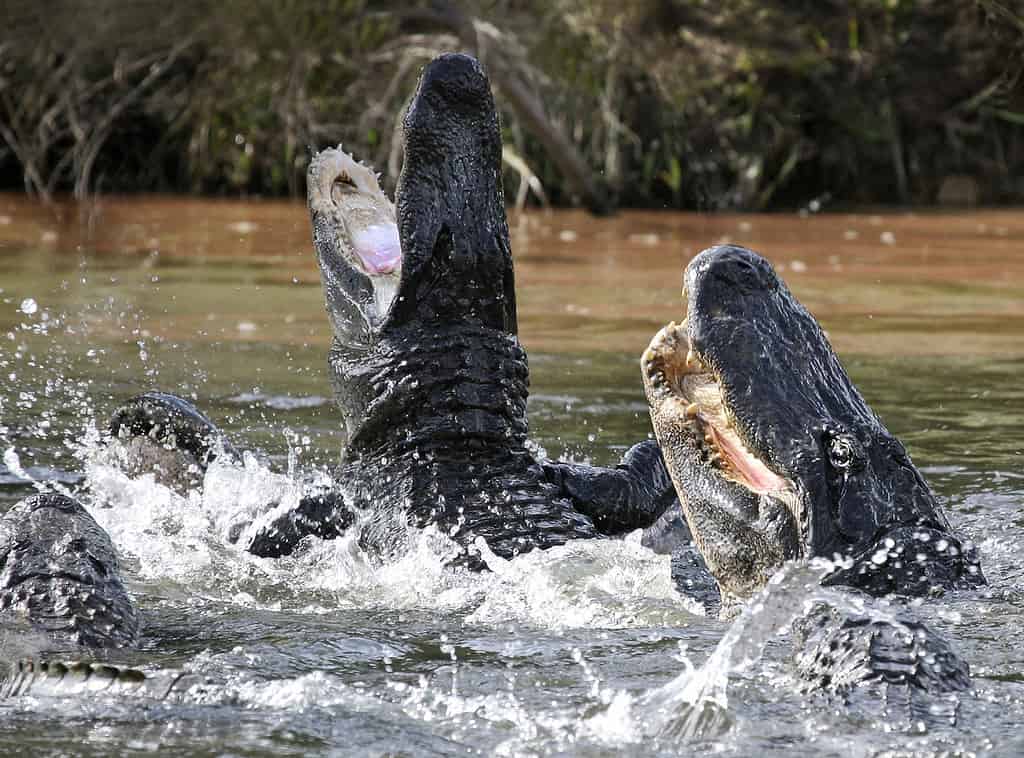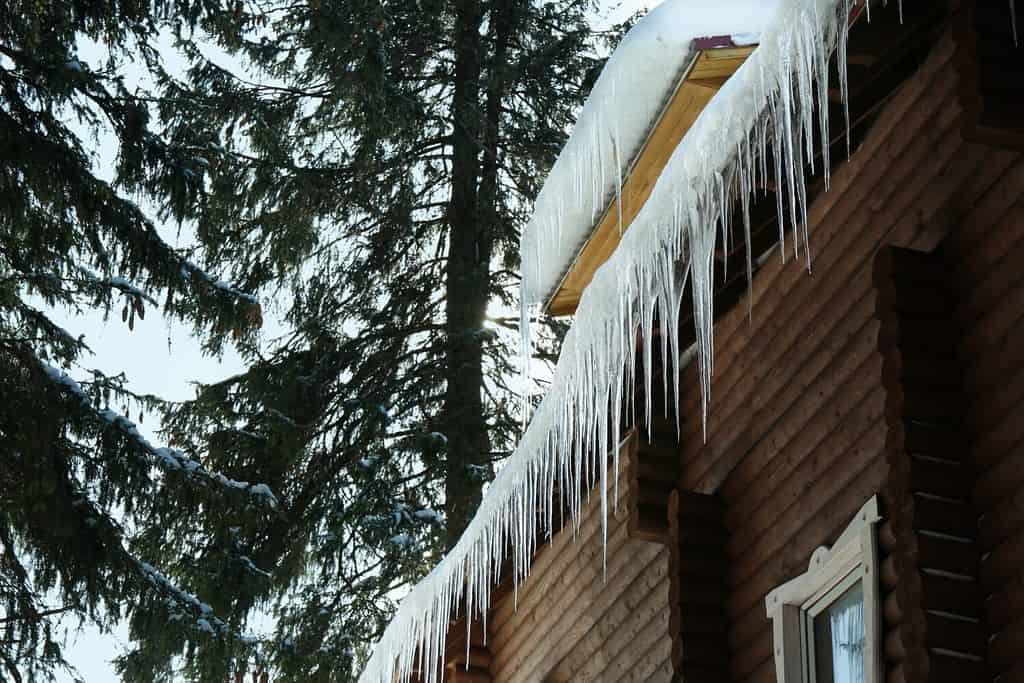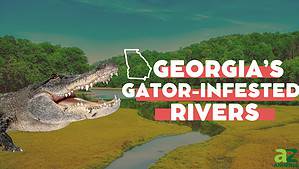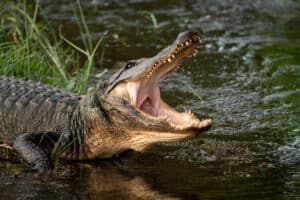Quick Answer
So far, there are no reports of alligators in Tennessee’s Douglas Lake, other than rumor. Keep reading below to find out more.
Whether there are alligators in Tennessee’s Douglas Lake or not is probably a matter of due time. Alligators are expanding northward, and we know that alligators are present in North Carolina. With Tennessee being a little bit of a jog to the west, it’s only a matter of time.
According to the Tennessee Wildlife Resources Agency, sightings of alligators throughout the southern border of the Volunteer State are growing. The reasons are obvious and completely natural. Alligators want what all living beings want—shelter, food, and water.
Tennessee is rife with all three, with a moderately acceptable climate to boot. Tennessee gets colder in the winter than the likes of Florida and Louisiana, but it’s nothing an alligator used to brumation can’t handle. It’s not like it’s Minnesota, after all.
Are There Sightings of Alligators in Tennessee’s Douglas Lake?

Alligators at snack time.
©© mark higgins/iStock via Getty Images
So far, there are no reports of alligators in Tennessee’s Douglas Lake, other than rumor. However, that’s not an indication that there aren’t any or that there never will be. Alligators are not like crocodiles. They are far more reclusive and don’t readily make themselves known.
Douglas Lake is fairly sizeable, and it might take a more numerous population to gain more attention. While Douglas Lake is not on Tennessee’s southern border, it’s only a few miles from North Carolina, where alligators are known to exist.
Plus, Douglas Lake is a sporadic lake in terms of its outline. Imagine slinging a tomato at a white wall as hard as you can. The resulting splatter might resemble Douglas Lake. Within this smorgasbord of watery perimeter, alligators can breed and grow for a long time before someone stumbles upon one.
Also known as Douglas Reservoir, Douglas Lake is huge, when you account for its meandering, spasmodic form. Built by the Tennessee Valley Authority, the shoreline of Douglas Lake (or Reservoir, if you will) features 555 miles (893.19 km) of shoreline and covers 30,600 acres of real estate.
It also features the largest reservoir tributary in the state, with over 4,500 square miles of drainage basin. That’s a lot of territory for a handful of alligators to hide in. So, while we’re not answering definitively, either way, whether alligators are in Tennessee’s Douglas Lake, we’re leaving the door open.
We know that it’s not too far north for an alligator to handle, and we also know that alligators reside in North Carolina, just a few miles east of the Tennessee border. We also know that alligators are already in the state, thanks to the work of the Tennessee Wildlife Resources Agency.
Can Alligators Handle the Tennessee Climate?
If alligators are currently populating Tennessee’s Douglas Lake, the biggest question is how they handle the climate. Alligators are notoriously deep south alligators, with Louisiana and Florida hosting over a million alligators apiece. Winter in southern Louisiana and all of Florida is a warm spring day compared to winters in the north.
Tennessee is also not a flat state. The Cumberland Plateau climbs thousands of feet skyward and is colder than the towns that live in its shadow. We mention the Cumberland Plateau because of the growing sightings of alligators in the southeastern part of the state and the presence of alligators in North Carolina.
You probably saw the word, “brumation” above, and, if you’re wondering what it means, it’s the alligator version of hibernation. Where hibernation is a deep slumber, brumation is more of a light snooze. The gator’s metabolism slows way down, and it ceases most of its physical activity.
Throughout their brumation period, alligators still move around, though very lethargic. They spend much of their brumation period completely underwater, surfacing only to take a breath once per day.
If the water freezes, it’ll surface just enough of a nostril to allow for breathing once the surface freezes. This is known as “snorkeling.” While the lakes in Tennessee don’t exactly freeze (only the surface in some lakes), this is more than an indication that alligators in Tennessee’s Douglas Lake are more than possible.
This allows it to tolerate even the harshest of winters in the deep southern states. However, is it enough to handle the climate in Tennessee? With alligators making appearances throughout the state and their presence in North Carolina, it appears they can handle it just fine.
How Cold is Too Cold for Alligators?

Long, narrow icicle formations.
©New Africa/Shutterstock.com
Alligators are capable of sustaining themselves in water that is roughly 40 degrees or higher. They’re known for surviving in chillier conditions, but it’s far from ideal for them. Cold weather or sudden and unexpected freezes will kill alligators from time to time.
For that reason, alligators aren’t likely to travel farther north than the likes of Tennessee and North Carolina. There are rare oddities here and there, such as alligators ending up in Illinois. But these are typically man-made mistakes, such as a pet owner dumping the gator off in a northern state or one escaping a zoo transport.
Are There Alligators North of Tennessee?
While the word is still out on whether there are alligators in Tennessee’s Douglas Lake, the occasional sighting north of the Volunteer State does happen. Unfortunately, for those north of Tennessee interested in spotting a gator, those sightings are anomalies. They aren’t the result of alligators migrating that far north.
You’re not likely to see alligators in Kentucky, for instance. At least not anytime soon, and probably not in our generation. That’s not to say there are no alligators in Kentucky, as they probably travel through on transports from time to time, on their way to one zoo or another. But, they aren’t heading that far north yet.
Of course, if the climate continues to warm, there may come a time when alligators in Kentucky are a very common thing. But that time is not today.
Final Thoughts
There may be alligators in Tennessee’s Douglas Lake. We just don’t have any direct evidence of it yet. If they are there, the numbers are too few and no one has run into one yet.
Alligators aren’t nearly as interested in humans as crocodiles are, and will usually make tracks when a human being approaches. The only exception is for anyone unlucky enough to stumble upon an alligator’s nest, and the mother is just returning home to check on her eggs.
If you’re in northern Tennessee and itching to see some alligators, turn on the TV or head south, because they just haven’t migrated that far north yet.
The photo featured at the top of this post is © Ernie Hounshell/Shutterstock.com
Thank you for reading! Have some feedback for us? Contact the AZ Animals editorial team.







